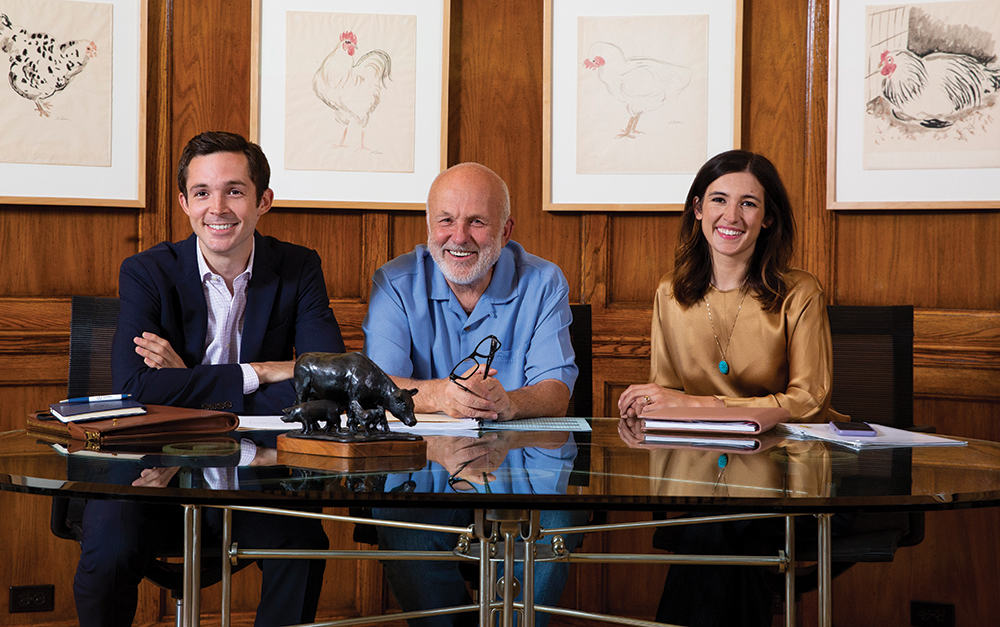Succession is one of the most popular shows on HBO. It’s sometimes even mentioned in the same breath as The Sopranos, Game of Thrones, and Veep.
Succession showcases super-rich, but deeply flawed characters who struggle for power and seem to face an endless maze of existential conflict. Viewers love watching the spoiled family members teeter on a knife’s edge of recognizable and relatable, admittedly more of the former since most of us aren’t billionaires. That said the show has undeniable appeal because it allows us to live serendipitously the lives of rich, powerful, and famous business titans.
But what about real life? What motivates iconic business leaders? How does succession really work in multi-billion dollar, global, iconic, family-owned businesses? How do companies handle horse-races among competing candidates—including family members—any one of whom may become the future heir to the throne? What role does the powerful board of directors play in the real world? After all, it’s ultimately the board’s most important job to make sure the ‘right’ CEO is appointed at the ‘right’ time.
These are very tough questions. Indeed, for the past 25 years I’ve been on a quest to find some answers, interviewing CEOs and Board members across the country—starting decades ago as a case writer at the Harvard Business School and then as a fellow at Yale’s CEO Leadership Institute and then hosting special CEO events and interviews at INSEAD, Spencer Stuart, Heidrick & Struggles, and at the World Economic Forum in Davos. I’m so focused on CEO succession I even wrote a book called, “Why Are We Bad at Picking Good Leaders?” All of this is to say, I’m obsessed with finding inspirational leaders.
Well, there’s no question John H. Tyson checks all of the boxes—a great leader, a great CEO, a great board chair, and a great father, who happens to own a well-known family-business—Tyson Foods a $25 billion, global enterprise.
Mr. Tyson, or ‘J.T.’, as he’s affectionately called at work, is the subject of today’s Leadership Icon series. A little bit about J.T. First, he’s a multi-billionaire. Let’s just get that little tidbit out of the way. But he’s so much more than that—he’s an authentic, level-headed, down-to-earth leader; a philanthropist; an inspirational human being; and a fairly decent golfer.
As Tyson Food’s current Board Chair, he’s been thinking about succession for a very long time, well before the Emmy Award-winning TV show ever existed.
JT provides us with a sneak peek inside the board room and reveals the true nature of sensitive family discussions about succession— the endless possibilities, the harsh realities, and the inevitable fears and anxieties.
First, how did JT get here? Let’s quickly rewind the clock. JT’s grandfather, named John W. Tyson, started the company in 1935 by loading up his truck with chicken raised in Arkansas and hauling them to Chicago where there was plenty of demand for fresh, tasty poultry. John W. was a visionary and an operational savant, who worked tirelessly to gain momentum in the early years. He succeeded—the business was off and running.
By 22 years old Don Tyson, the founder’s son, was hooked and in love with the company his dad started. Don left the University of Arkansas to join Tyson Foods as a general manager, working 6 days a week at company headquarters, and instead of relaxing on the 7th day, he spent time learning more about chickens at his dad’s farm. Hard work paid off—Don was appointed CEO and eventually took the company public in 1952 on the New York Stock Exchange.
Over the decades the company experienced rapid growth, introduced several new lines of business and expanded globally. A new kind of leader was needed to guide the company into the 2000’s—one who could accelerate rapid growth while confronting head-on new kinds of challenges ranging from animal treatment to environmental cleanliness to employee welfare.
Enter JT. It was now his turn to make an indelible mark on the global enterprise. The succession baton was officially handed to him. Expectations were high, of course. No one with higher expectations than JT himself.
The process of successfully overcoming alcoholism put JT in touch with his core values and true north. In addition to focusing on ‘hard’ business results like corporate growth, safety and profitability, JT wanted to leave a unique mark by equally focusing on the ‘soft’ stuff, like creating a culture of innovation and leadership development and by creating the kind of uniquely fertile environment in which employees could truly live their core values, despite daunting obstacles.
Staying true to his personal values, JT also wanted Tyson Foods to make a social impact by focusing on eliminating hunger, creating a clean environment and fighting for global sustainability. John believed the company could do well (financially) by doing good (socially). During his six-year tenure John worked hard and by all objective measures was a screaming success. With no family member old enough to replace JT, the CEO reins were passed to someone outside of the family. JT remained on the Board and as mentioned, is still Chairman.
During our interview, J.T. couldn’t help pondering the future. Would one of his children continue the legacy started by his granddaddy and become a future CEO? Or would the CEO baton continue to be passed to non-family members? If so, would Tyson Foods anoint a CEO from outside the company, or stick with someone they knew from inside the organization? Succession was still front and center in J.T.’s mind, as it should be for all responsible board members of any organization.
Like everything else, John wanted a transparent and authentic process to guide future succession decisions. Rules and expectations would be clearly communicated to his children and to the full board.
In my interview with John, he boils it down like this: my children have a few distinct choices— they can put their hat into the ring and fight to become our company’s future CEO; they can choose to become a non-executive board member and not have to worry about running the company day-to-day; or hell, they can go to the Bahamas and open a bar. As unsettling as it may seem, the last choice was perfectly acceptable to John, “but if the kids are hanging out at the beach they certainly won’t be involved in the operations of our business or defining our future legacy. It’s their choice,” according to John.
Just like the HBO show makes painfully clear, CEO succession is never easy, full of unforeseen human obstacles and lots of drama, sometimes even trauma. But it must be carefully managed. John shares his wisdom: boards need to get an early start on succession, they need to prepare for interpersonal conflict, they need to be transparent and clear about the rules of the road, and perhaps most important, they need to create a culture that inspires young talent—of all shapes and sizes— to become the kind of leaders who can make Tyson Foods—and the rest of the world—a better place.
*This interview is presented by CEO Fellows in partnership with N2Growth- Request to join our exclusive leadership forum and have conversations with our Culture Champions, here. We invite you to share your story and get feedback from iconic leaders like John Tyson, executive advisors, top leadership professors, and gifted students from around the world.







